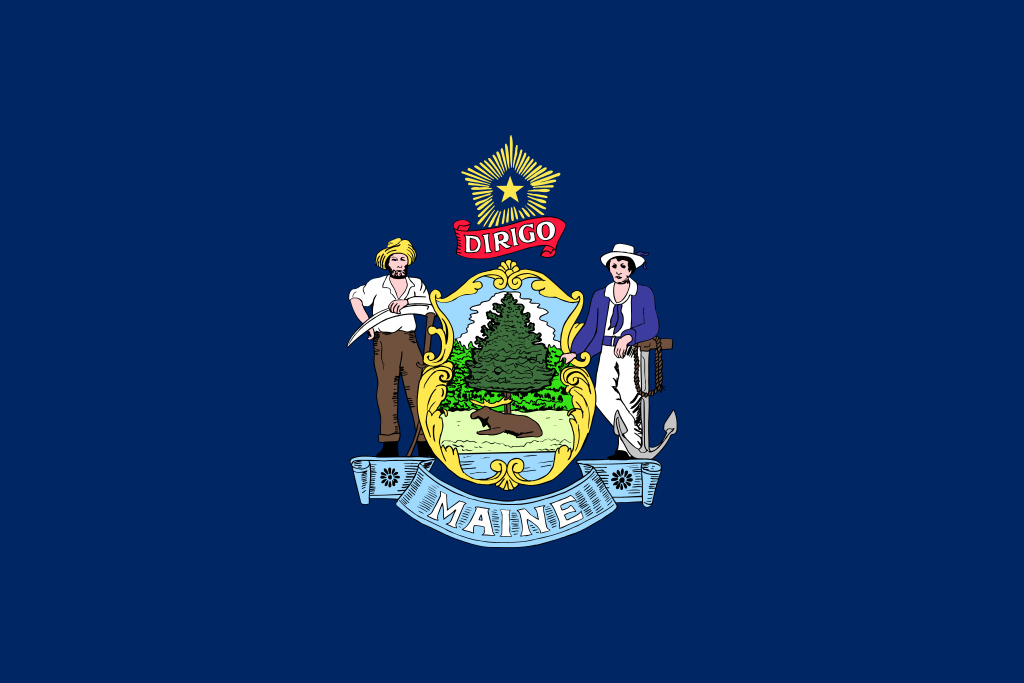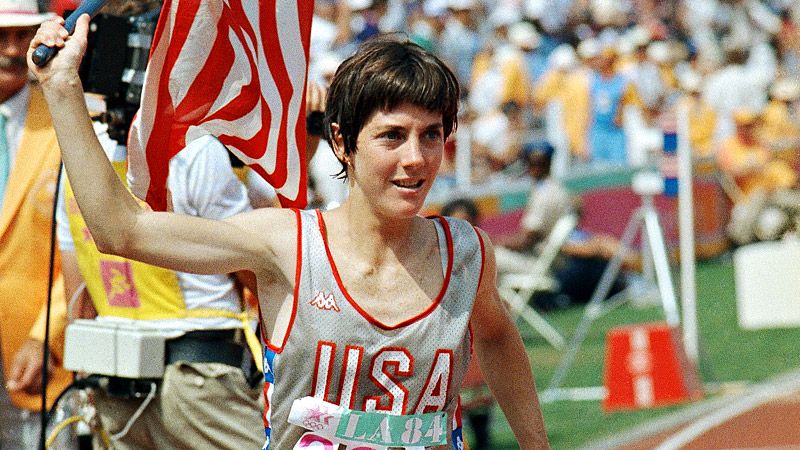March 15, 1820: Maine is separated from Massachusetts, and admitted to the Union as the 23rd State, as part of the Missouri Compromise of 1820, with Missouri becoming the 24th State: 1 new State were slavery was legal, 1 where it was not.
Top 10 Athletes From Maine
Of the 26 NFL players born in Maine, the best was probably John Bunting of Portland, a linebacker who won an NFC Championship with the Philadelphia Eagles and a USFL Championship with the Philadelphia Stars, but he grew up in Silver Spring, Maryland, a D.C. suburb, so he's out. Nobody else looked like a good candidate.
Bob Stanley of the star-crossed 1978 and 1986 Boston Red Sox was born in Maine, and leads all such men with 132 saves, and also won 115 games. But he grew up in Kearny, Hudson County, New Jersey. Not that I, as a native of North Jersey, would want to claim him.
Jeff Turner is the only NBA player to have been born in Maine, in Bangor, and won a Gold Medal with the U.S. team at the 1984 Olympics in Los Angeles. But he grew up in Florida, so he qualifies there.
Honorable Mention to Louis Sockalexis of Old Town. A member of the Penobscot tribe, the outfielder starred with the Cleveland Spiders of the National League as a rookie in 1897, batting .338 with 16 stolen bases.
But his drinking problem, all too common among Native Americans, had already gotten him expelled from Notre Dame. And on July 4, when the brothel he was visiting was raided by the police, he jumped out of a 2nd-story window and wrecked his ankle. He was never the same player.
The circumstances surrounding the 1899 Cleveland Spiders are too convoluted to briefly summarize, but they were the worst team in Major League Baseball history, and they were his last major league team. (They released him on May 7. If they'd kept him, despite all his trouble -- he was hitting .273 -- maybe they wouldn't have finished 20-134.) He died of tuberculosis in 1913, only 42 years old.
It was long presumed that the Spiders' American League replacements, originally called the Blues, then the Broncos, and then the Naps in honor of 2nd baseman and manager Napoleon Lajoie, were renamed the Indians in 1915 in honor of either "Sock," the 1st Native American to play in the major leagues, or the tribes that once lined the shore of Lake Erie. Neither story is true: Baseball is a monkey-see-monkey-do game, like most sports, and the year before, the World Series had been won by the Boston Braves.
Honorable Mention to Bill Carrigan of Lewiston. A decent catcher, he wasn't much of a hitter. But he played on 3 World Series winners for the Boston Red Sox, in 1912, 1915 and 1916. For the last 2, he was player-manager, and is the only man since 1898 to manage a Boston baseball team to back-to-back Pennants. The Red Sox elected him to their team Hall of Fame.
Honorable Mention to Clyde Sukeforth of Washington. He was a good-field-no-hit catcher, although he did bat .354 in 262 plate appearances for the 1929 Cincinnati Reds. But he's best known for 2 contributions to the lore of the Brooklyn Dodgers -- 1 positive, 1 negative.
In 1945, team president and part-owner (the operational owner) Branch Rickey sent him around the country to scout Jackie Robinson, whom Rickey had heard could be the right man to be the 1st black player in modern baseball. Not only did Sukeforth send Rickey a good report, but he turned out to be Robinson's 1st major league manager -- albeit on an interim bases, following the suspension of Leo Durocher, managing only Opening Day 1947 before turning the team over to Burt Shotton.
In 1951, "Sukey" was in the bullpen watching pitchers warm up during the Playoff game that would decide the National League Pennant, between the Dodgers and their arch-rivals, the New York Giants. When Don Newcombe ran out of gas in the bottom of the 9th, manager Charlie Dressen called the bullpen and asked how the pitchers were doing. Sukeforth said that Carl Erskine was having control problems, but Ralph Branca was throwing well. Dressen told him to send in Branca.
Big mistake. The batter was Bobby Thomson, who could hit nothing but a fastball. Branca had nothing but a fastball. Although a year away from becoming a star, Erskine may already have had the best curveball in the NL. Had Sukeforth remembered that, or if he had realized Thomson was the next batter, Erskine might have gotten Thomson out, and the Dodgers might have won the Pennant, instead of Thomson hitting the most famous home run of all time.
Honorable Mention to Jim Beattie of South Portland, who helped the Yankees win the 1978 World Series. His career record as a pitcher was 52-87. He later served as general manager of the Montreal Expos and the Baltimore Orioles, and is now a scout with the Toronto Blue Jays.
Honorable Mention to Cindy Blodgett of Fairfield. She is the all-time leading scorer, male or female, in Maine high school basketball, leading Lawrence High School to an 84-4 record. At the University of Maine, she led women's college basketball in scoring all 4 seasons.
She played for the WNBA's Cleveland Rockers and Sacramento Monarchs, and later returned to UM as head coach. She is now an assistant coach at Boston University, under former Sacramento teammate Kady Steding.
10. Chet Bulger of Rumford. A 2-way tackle, he was a starter on the line of the Chicago Cardinals team that won the NFL Championship Game in 1947 and lost it in 1948.
Had there been an All-Star Game then, he would have made it every year through 1931. Then he got hurt, missed the entire 1932 season, and was never the same. He only played 35 games in 1933, never appeared in the majors again, and hung on in the minors for a while. His 66 home runs lead all Maine-born players, as does his .305 lifetime batting average for all Mainers with at least 400 major league plate appearances.
He managed the Hartford Chiefs to the 1944 Eastern League Pennant, and briefly managed the Boston Braves. But he was fired in 1946, never returned to the major leagues in any capacity, and committed suicide in 1972.
8. Eric Weinrich of Gardiner. Though born in Roanoke, Virginia, he grew up on the Kennebec River near the Maine State capital of Augusta, and had a 17-year career as an NHL defenseman, starting in 1989 with the New Jersey Devils and carrying through Chicago, Montreal, Boston, Philadelphia, St. Louis and Vancouver. He finished his career with 70 goals and 318 assists.
Of the 7 NHL players who were actually born in Maine, 2 active players, Brian Dumoulin of Biddeford and the Pittsburgh Penguins, and Garnet Hathaway of Kennebunkport and the Calgary Flames, have, between them, scored 63 points. Danny Bolduc of Waterville and the late 1970s Detroit Red Wings, had 41. The other 4 have a grand total of 1.
7. Freddy Parent of Sanford. He was the shortstop of the Boston Americans, forerunners of the Red Sox, that won the 1st World Series in 1903, and the American League Pennant again in 1904. He was the last survivor of those teams, living until 1972. In a 12-season major league career, he batted .262 with 184 stolen bases.
6. Mike Bordick of Winterport. A shortstop, he reached the World Series as a rookie with the 1990 Oakland Athletics, and the American League Championship Series with them that year and in 1992. He reached the ALCS again with the 1997 Baltimore Orioles, and made the All-Star Game and won a National League Pennant with the Mets in 2000. The Orioles named him to their team Hall of Fame.
Rip Black of Bailey Island.
He's lucky I don't have the sports journalism profile that Chris Berman, nicknamer par excellence, has, because I thought of what sounded like a sure "Bermanism": Mike "I Need Viagra For My Bored Dick."
5. Bill Swift of South Portland. With the 1992 San Francisco Giants, he went 10-4, and led the National League with a 2.08 ERA. In 1993, he went 21-8. In 1995, he helped the Colorado Rockies, in only their 3rd season, win the NL Wild Card. He finished 94-78, with 17 saves, and his 767 strikeouts lead all Maine-born pitchers.
4. Joey Gamache of Lewiston. The WBA briefly recognized him as Super Featherweight Chamion in 1991 and Lightweight Chamion in 1992.
3. Jack Coombs of Waterville. He was known as Colby Jack, because he attended Colby College in his hometown. Although he could throw some high cheese. He arrived with the Philadelphia Athletics in 1906, nearly helped them win the American League Pennant in 1907, and did help them win it in 1910, 1911, 1913 and 1914.
In 1910, he went 31-9, and won 3 more games in the World Series, leading the A's over the Chicago Cubs. The A's also won with him in 1911 and 1913, in each case over the New York Giants. In 1916, he won a National League Pennant with the Brooklyn Robins. (The once-and-future Dodgers were nicknamed for their manager, Wilbert Robinson.)
His final total was 158-110, making him the winningest Maine-born pitcher. He died in 1957, and the Phillies later named him to the Philadelphia Baseball Wall of Fame. His brothers Bobby and Danny were also major leaguers, albeit briefly.
2. George Gore of Hartland. A center fielder known as "Piano Legs," he starred for the Chicago White Stockings, forerunners of the Cubs. In 1880, he won the National League batting title, helping start a string of 5 Pennants in 7 seasons for the White Stockings. In 1881, he set a record with 7 stolen bases in a game; in 1885, another with 5 extra-base hits.
He last played in 1892, but his 1,612 career hits and his OPS+ of 136 still lead all Maine-born players. His lifetime batting average is .301. Nobody alive today saw him play, but he probably should be in the Baseball Hall of Fame. But, unlike his teammates Adrian "Cap" Anson, Mike "King" Kelly, Edward "Ned" Williamson, Frank "Silver" Flint and John Clarkson (no known nickname), his nickname was considerably more colorful than he was, and he got forgotten. (Anson, Kelly and Clarkson are in the Hall.)
1. Joan Benoit of Cape Elizabeth. Although part of the large French-Canadian community in New England, she pronounces her name Benn-OYT instead of the proper French Benn-WAH. And she now goes by her married name, Joan Benoit Samuelson.
She won the Boston Marathon in 1979 and 1983, each time setting a new course record for women. She won the 1st-ever women's Olympic Marathon, in Los Angeles in 1984. In 1985, she received the James M. Sullivan Award, for the outstanding American amateur athlete of the year.



No comments:
Post a Comment